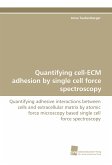Adhesive interactions play a major role in the development of multicellular organisms by guiding and anchoring cells into their appropriate locations. Adhesion is also important in the maintenance of the body: changes in the expression or function of cell adhesion molecules are implicated in all steps of tumor progression. Implantology research and tissue engineering are directly focused on cell-surface interactions. Modifying the surface of an implant either by providing chemical and/or topographical cues encourages bone cell attachment. Tissue engineering aims to replace or restore the anatomic structure and function of damaged or missing tissue. Cell adhesion is an important parameter in the development of biodegradable scaffolds and cell sheet engineering techniques. Therefore, cell adhesion is a crucial parameter that has to be quantified on living cells.
Hinweis: Dieser Artikel kann nur an eine deutsche Lieferadresse ausgeliefert werden.
Hinweis: Dieser Artikel kann nur an eine deutsche Lieferadresse ausgeliefert werden.








